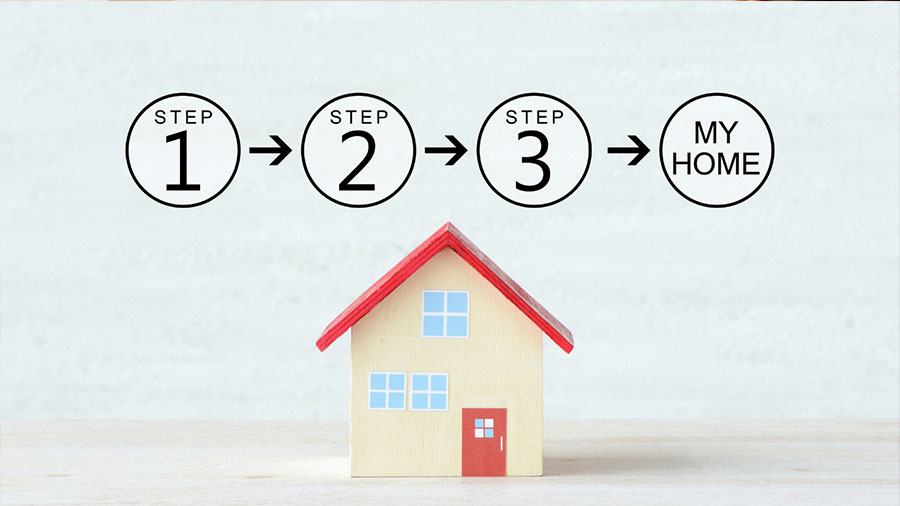The Ultimate First Home Buyers Guide for 2024
Home » The Ultimate First Home Buyers Guide for 2024
Are you ready to embark on the exciting journey of buying your first home? Navigating the property market can be daunting, but with the proper guidance and a clear understanding of the process, it can be a gratifying experience. In this First Home Buyers Guide, we’ll cover essential tips and insights to help you confidently progress toward homeownership and secure the keys to your dream home.
This guide will provide tips on how to:
Assess your financial readiness to maximise borrowing power and secure the best loan.
Learn key terms & concepts, budget responsibly, and search strategically for your dream home.
Compare lenders and consider features/rates to navigate the home-buying process confidently.

Before diving into the property market, assessing your financial readiness is crucial. Being well-prepared will make the home-buying process smoother and boost your chances of securing a favourable home loan.
Your borrowing power, income stability, and deposit size are vital aspects to consider.
It is essential to understand the factors that influence your borrowing capacity, such as income, credit score, debt-to-income (DTI) ratio, living expenses, financial commitments, credit history, and deposit size. The larger your deposit, the more you can borrow. A high credit score and a low debt-to-income (DTI) ratio will make you more attractive to lenders.
By taking control of these factors, you can put yourself in a strong position to secure the best possible loan for your dream home.
Lenders favour applicants with a stable income, preferably from permanent full or part-time employment. You can use alternative documentation to demonstrate income stability for self-employed individuals, such as tax returns and financial statements.
By showcasing consistent income, you’re more likely to gain lender approval, putting you one step closer to your dream home.
Saving for a deposit is a crucial step in the home-buying process. Lenders typically prefer a deposit of at least 20% of the property’s purchase price. However, with a good credit rating and steady income, you can secure a loan with a smaller 5-10% deposit.
You can confidently climb the property ladder by diligently saving and exploring alternative deposit sources, such as family gifts and government incentives.

As you venture into the world of homeownership, it’s essential to familiarise yourself with key terms and concepts. Understanding the Loan-to-Value Ratio (LVR), Lenders Mortgage Insurance (LMI), genuine savings, and government grants will help you navigate the process easily and make informed decisions at every step.
The Loan-to-Value Ratio (LVR) is a crucial measure used by lenders to express the ratio of a loan to the value of the purchased property. In simpler terms, LVR is the percentage of a home’s value you can borrow to buy it.
Lenders often require an LVR of 80% or lower to avoid the need for lenders mortgage insurance (LMI). By understanding LVR, you can ensure you get the most value for your home loan.
Lenders Mortgage Insurance (LMI) is an insurance policy that provides an extra layer of security for lenders, ensuring they can recover the outstanding loan balance even if the borrower cannot repay their loan. Usually, LMI is required for loans with an LVR of more than 80%.
Although it’s an additional cost, LMI can be beneficial by allowing you to purchase a property with a smaller deposit, helping you enter the property market sooner.
The information provided in this article may be too much to digest for some. Perhaps you may want to consider using a mortgage broker to find you next home loan. It is part of what mortgage brokers do.
Saving money for a house can take a while and requires discipline and patience. Genuine savings are funds that you’ve diligently saved up over a period of at least three months. Most lenders often require borrowers to demonstrate that they have at least 5% of the property’s purchase price saved as genuine savings.
By steadily building your genuine savings, you can show lenders that you’re financially responsible and capable of managing a home loan.
First home buyers may be eligible for government grants and schemes. These could assist when buying a home. These financial assistance options, such as the First Home Owner Grant and stamp duty concessions, can significantly support achieving your dream of homeownership.

Enhancing your borrowing power can be critical to securing the best possible home loan. By understanding the 5 C’s of Credit (character, capacity, capital, collateral, and conditions) and considering switching lenders, you can increase your borrowing capacity and improve your chances of obtaining a favourable loan.
The 5 C’s of Credit are essential indicators of a borrower’s creditworthiness, used by lenders to assess loan applications. Character refers to your trustworthiness based on credit history and payment history. Capacity indicates your ability to repay the loan, considering factors like income and debt-to-income ratio.
Capital is a valuable resource, while collateral offers security for the loan. Finally, conditions refer to the terms of the loan.
Switching lenders can be a strategic move to increase your borrowing power. By researching different lenders and their loan products, comparing competitive interest rates and fees, and applying for a loan with the lender that best meets your needs, you can potentially save on interest rates and secure a loan with more favourable terms.
Keep an open mind and explore various lenders to ensure you find the credit provider that best fits for your financial situation.

As you prepare to purchase your first home, it’s essential to stay realistic about your budget and consider additional costs that may arise. By accounting for these expenses and avoiding the temptation to borrow too much, you can set yourself up for financial success in the long run.
When budgeting for your first home, it’s vital to consider hidden costs that may not be immediately obvious. These include establishment fees, strata fees, conveyancer fees, valuation fees, etc.
By accounting for these additional expenses, you can avoid any financial surprises.

Now that you’re financially prepared, it’s time to start the exciting journey of finding your dream home. You’ll be well-equipped to secure the perfect home that meets your needs and budget by utilising various property search strategies and understanding the different property purchases and methods.
To find your ideal property, consider using online listings, attending open houses, and exploring different property types, such as single-story homes, units, townhouses, and dual-occupancy homes. Additionally, don’t shy away from seeking professional advice from a buyer’s advocate or buyer’s agent, who can provide valuable insights and guidance throughout the process.
Understanding the various purchase methods, such as private treaty sales, sales by auctions, and off-the-plan purchases, can help you easily navigate the property market. In a private treaty sale, you can make written offers through a real estate agent and negotiate the price before the seller accepts or rejects the offer.
It is important to be well-prepared and informed before participating, as auctions may require pre-approval, immediate contract signing, and no cooling-off period. You must check the laws for sales by auction for each State and Territory.
Off-the-plan purchases involve investing in a property that has yet to be built, offering unique opportunities and potential savings.

Once you’ve found your dream property, securing your home loan is next. Choosing the right lender and understanding various loan features and interest rates can make a difference in your overall borrowing experience.
It’s important to compare different lenders and loan products to find the best deal for your needs. Consider the interest rate, fees, repayment terms, and other features to ensure you get the best deal.
When selecting a lender, it’s essential to consider factors such as the lender’s reputation, customer service, and fees. You can work with a mortgage broker who can help you compare lenders and find the best loan for your needs, or go directly to a lender and apply for a loan yourself.
Both options have advantages, so weighing the pros and cons and making an informed decision that suits your financial situation is best.
When selecting a home loan, consider various loan features, such as repayment flexibility, portability, and the ability to make extra repayments. Additionally, compare fixed and variable interest rates to determine the best option for your financial needs.

With your finances in order and your dream home in sight, it’s time to navigate the final steps of the home-buying process. This includes making an offer, exchanging contracts, and reaching the settlement stage.
When making an offer on a property, it’s important to research the property’s value and consider the seller’s motivation to ensure you make an informed and competitive offer. All offers and counteroffers should be made in writing and signed by you, with the agent promptly passing them on to the seller.
If your offer is accepted, a cooling-off period may be available upon acceptance contract of sale, allowing you to withdraw from the deal if necessary. You must check the laws for the cooling-off period for each State and Territory.
The final steps in the home-buying process involve exchanging contracts, deposit payments, and formal home loan approval before reaching the settlement stage. Both parties sign and swap contracts during the contract exchange, with the buyer typically paying a deposit.
Settlement typically occurs 30-90 days after the contract exchange. At settlement, the remaining sale price is paid, and the buyer becomes the legal owner of the property.
The journey to homeownership can be a thrilling and rewarding experience when armed with the right knowledge and guidance. You can confidently secure your dream home and embark on an exciting new chapter by assessing your financial readiness, understanding key terms and concepts, boosting your borrowing power, and navigating the home-buying process. Now it’s time to take the first step and make your homeownership dreams a reality.
Yes, you can buy a house with a $20,000 deposit. It is possible to find lenders that accept a smaller deposit amount and offer various loan options to help you purchase your first property here.
Before committing, it’s important to consider how much you can realistically afford, the condition of the property and any associated fees.
Be sure to research the local area and work with an experienced professional mortgage broker to ensure you make a sound financial investment. Finally, use your head and not your heart when negotiating to get the best deal possible.
Most first-time home buyers don’t need to put down 20% for a home loan – many are comfortable putting down as low as 5% as a starting point. Most first-home buyers don’t have a 20% deposit. So you can have confidence that you will be supported in your choice to put down less than 20%.
According to Digital Finance Analytics, the median age of a first homebuyer nationally has risen by a full decade to 34.5 years from 2000 to 2022.
